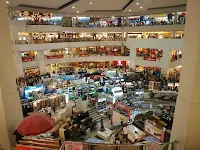what is Commerce?
Commerce deals basically with buying and selling of goods and services. It also covers the services which help in carrying out buying and selling. Such services include transportation, ware housing, banking, insurance and advitising. These commercial activities are perform to earn a living.
 |
| Commerce |
In its broadest sense, commerce is the activity of buying and selling goods and services. It covers a wide range of businesses, from retail stores and businesses that sell directly to consumers, to companies that sell to other businesses.
E-commerce is a type of commerce that takes place online, over the internet. This can include buying and selling goods and services, as well as transferring money and other data.
There are many different types of commerce, but some of the most common include:
• Retail commerce: This is the type of commerce that most people are familiar with. It refers to the buying and selling of goods and services in physical stores, or online.
• Wholesale commerce: This type of commerce involves the buying and selling of goods and services between businesses.
• Manufacturing commerce: This type of commerce refers to the production of goods and services.
• Service commerce: This type of commerce covers the buying and selling of services, such as professional
commercial activities
Farmers grow yams, groundnut, cocoa ,and beans among other farm produce. Some traders boy products like yam groundnut, cocoa and beans to
sell them to consumers.
Manufacturers produce goods in there factories, which are sold to wholesalers . The wholesalers then sell goods to retailers who finally sell the to consumers. All these act of buying and selling are commercial activities.
Commercial activities include the following ;
- Trading, the act of buying and selling of goods and services
- Transportation, movement of goods fTom one place to the other
- Warehousing, safekeeping of goods in a place over time.
- Banking, deals with the finance of trading activities.
- Insurance, this is the bearing of risk of investment.
- Advitising, involve telling the people about the existence and uses of goods and services all this are important commercial activities.
importance of commerce
In today's world, commerce is an increasingly important part of our lives. It is the process of buying and selling goods and services, and it is a vital part of the global economy.
There are many reasons why commerce is so important. For one, it allows us to exchange goods and services with others, which can be beneficial for both parties involved. For example, if I have a surplus of apples, and you have a surplus of oranges, we can trade goods so that we each have a more diverse and balanced diet.
Commerce also allows us to specialize in the production of certain goods or services. This is important because it enables us to become more efficient and productive in our work. For example, if I am a carpenter, I can specialize in making chairs, and you can specialize in making tables. We can then trade our goods and services, and both of us will be better off.
Lastly, commerce plays a vital role in the economy. The commercial activities enumerated earlier show the importance of commerce. A town or country where more commercial activities take place develops faster and better than a town or country where there are little commercial activities.
As blood is to the life of a man so are commercial activities to a country. In this towns, there are many big markets ,warehouse, banks and insurance companies. They are there to aid buying and selling activities. Japan, America and Britain are big and prosperous countries because they carry out a lot of commercial activities.
Some of the major importance of commerce include the following;
- it creates a link between the manufacturers ,the buyers as sellers
- It helps in transportation of goods from one place to the other.
- Commerce develop the banking system
- Commerce contribute positively to other commercial activities
- It helps the country develops faster.
Commerce and the whole economy;
 |
| Commerce and economy |
It is commerce that brings goods from a factory to the consumer or farm products to the consumers in the urban areas. Commerce therefore links producers with Consumers in the economy.
Other activities like banking, insurance and advertising facilitates the link between the producers and the consumers.
Division of commerce
It is clear here that commerce can broadly be divided into trade and the activities that aid commerce. The activities that aid commerce include banking, insurance ,advertising ,transportation, communication and warehousing. It must be mentioned that trade is the most important part of the division of commerce.
In the United States, the division of commerce is the process by which the federal government allocates funds and resources to the states for the purpose of economic development. This process is overseen by the Department of Commerce, which is responsible for ensuring that the states receive their fair share of resources.
The division of commerce is a vital part of the economy, as it allows the states to compete for resources and develop their economies. Without this process, the states would be at a disadvantage when competing for resources.
The division of commerce is also important for the states to maintain their competitiveness. If one state were to receive a greater share of resources than another, it would have an advantage in terms of economic development. This would lead to a situation where the states would be in constant competition with each other, which is not conducive to economic growth.
The division of commerce is thus a necessary part of the economy, and it is vital that the states receive their fair share of resources.
Division of trade
Trade can be divided into two divisions. These are home or domestic trade and foreign or international trade .
In economics, division of trade is the specialization and separation of production based on the particular skills of laborers. A country or region can improve its overall productivity by specializing in the production of goods in which it has a comparative advantage and trading for other goods.
The benefits of division of trade are based on the theory of comparative advantage. This theory states that a country or region will produce more efficiently if it specializes in the production of goods in which it has a comparative advantage. For example, if a country has a comparative advantage in the production of wheat, it will produce more wheat than any other country. By specializing in the production of wheat, the country can trade for other goods, such as cloth. As a result, both the country and the world as a whole will be more productive.
There are several factors that can lead to a comparative advantage, including natural resources, technology, and the skill of the workforce. A country with a lot of farmland may have a comparative advantage.
Home trade (Domestic or internal trade)
Home Trade can be described as buying, selling and exchange of goods and services among the people living in the same country for example, traders from Lagos, oyo, travel to Kaduna ,Kano Abuja etc to buy beans, cows, onion, ginger, tomatoes carrot etc for sale in Lagos and likewise traders from the north travel to buy Kola nut, palm oil, coconut etc. In home trade only one currency is involved. There are no custom duties paid, there are no trade barriers such as tariffs and import duties etc. Home trade is subdivided into;
wholesale trade
wholesale trade, involves large scale purchase of goods directly from manufacturers or producers and sale of such goods in small quantities to the retailer . Traders involve in large scale purchase are called wholesalers or distributors. Wholesalers are traders who buy goods in large quantities for sale to the retailers, because wholesalers buy in large quantities they must have huge capital and big ware houses for their stock . Wholesalers usually deals in cement, paints, computers, mobile phone products .
The retail trade
Retail trade involves purchase of Many products in small quantities and sale such products to the final consumer. A retailer is therefore s trader who buys goods directly from the wholesalers in small quantities and sell directly to the consumers .
Foreign trade(external or international trade)
Foreign trade is trade between the people of a country and people of another countries. A trade between Nigerian nationals and the nationals of Canada, United States is foreign trade. It involves the use of foreign currencies to pay for goods and services bought for other countries .Trade barriers such as language, tariffs, and outright ban of import affect foreign trade. Foreign trade can also be subdivided into three export, import, and entreport trade.
Types of commerce
There are many types of commerce, but some of the most common are:
1. Business-to-business (B2B) commerce: This type of commerce refers to the exchange of goods and services between businesses. For example, a company might purchase raw materials from another company in order to manufacture a product.
2. Business-to-consumer (B2C) commerce: This type of commerce refers to the sale of goods and services from businesses to consumers. For example, a company might sell its products through a retail store or online.
3. Consumer-to-consumer (C2C) commerce: This type of commerce refers to the sale of goods and services between consumers. For example, an individual might sell a used item through an online marketplace.
4. Commerce-to-consumer (C2C) commerce: This type of commerce refers to the sale of goods and services from businesses to consumers. For example, a company might sell its products
Inconclusion Commerce is the activity of buying and selling goods and services.
The history of commerce is long and complex, dating back to the earliest civilizations. In its simplest form, commerce is the exchange of goods and services between two parties. But as civilization has evolved, commerce has become increasingly complex, involving financial instruments, middlemen, and international trade.
Today, commerce is a vital part of the global economy, and its importance is only likely to grow in the coming years. As the world becomes more connected, businesses are finding new ways to reach customers and tap into new markets. And with the rise of e-commerce, commerce is becoming more convenient and accessible than ever before.
Whether you’re a small business owner or a global corporation, commerce is an essential part of your operations. And as the world of commerce continues to evolve, it’s important to stay up-to-date on the latest trends and developments.







0 Comments